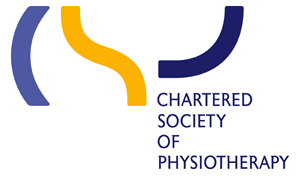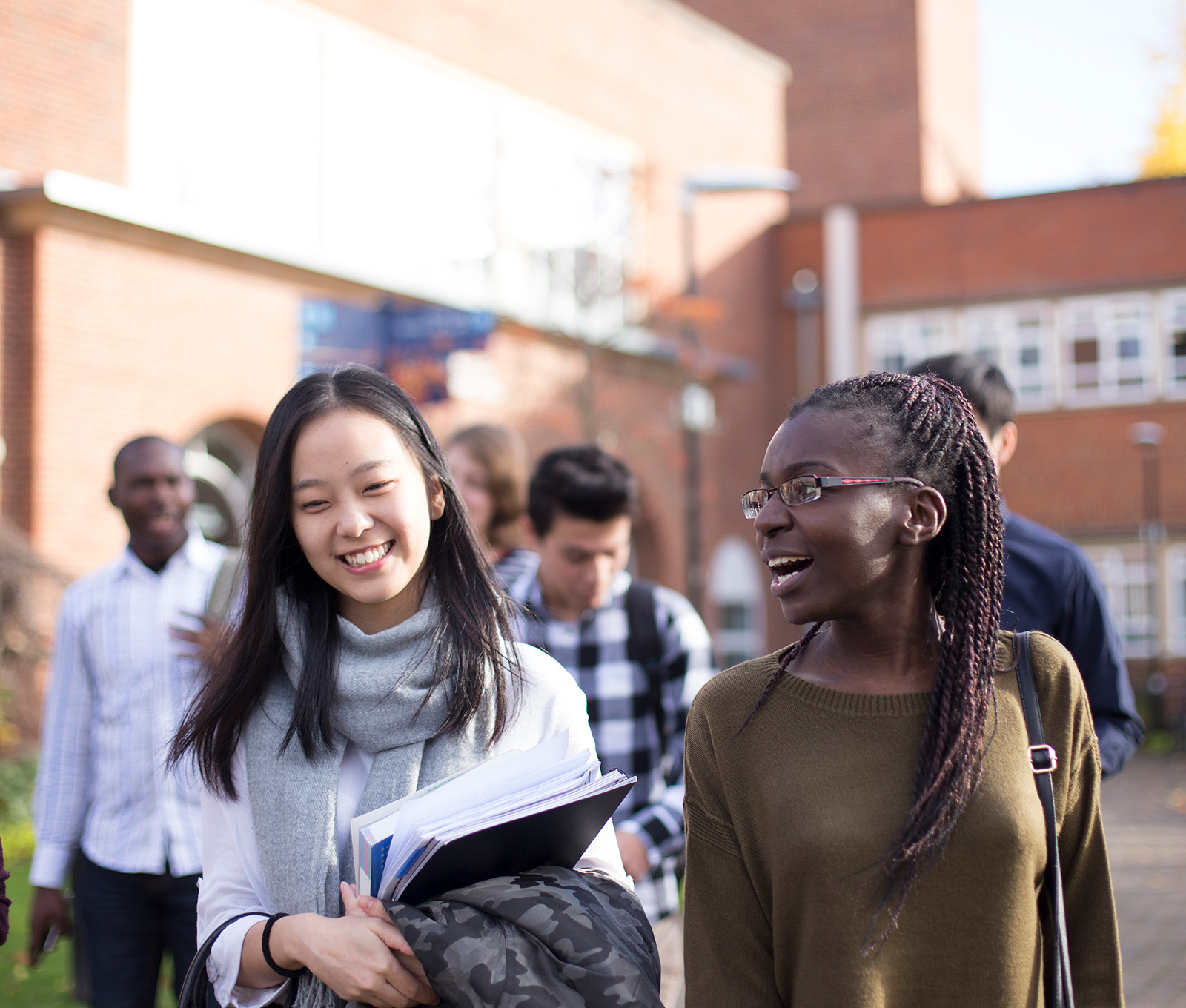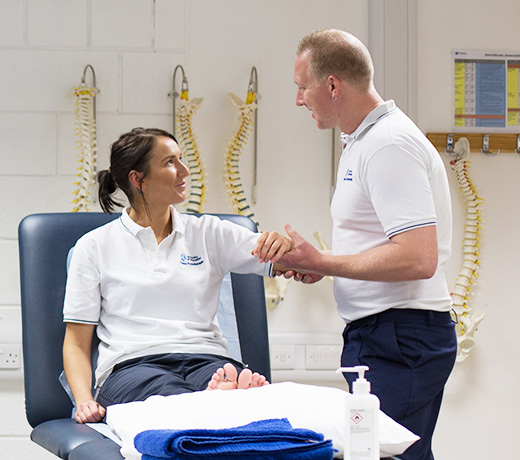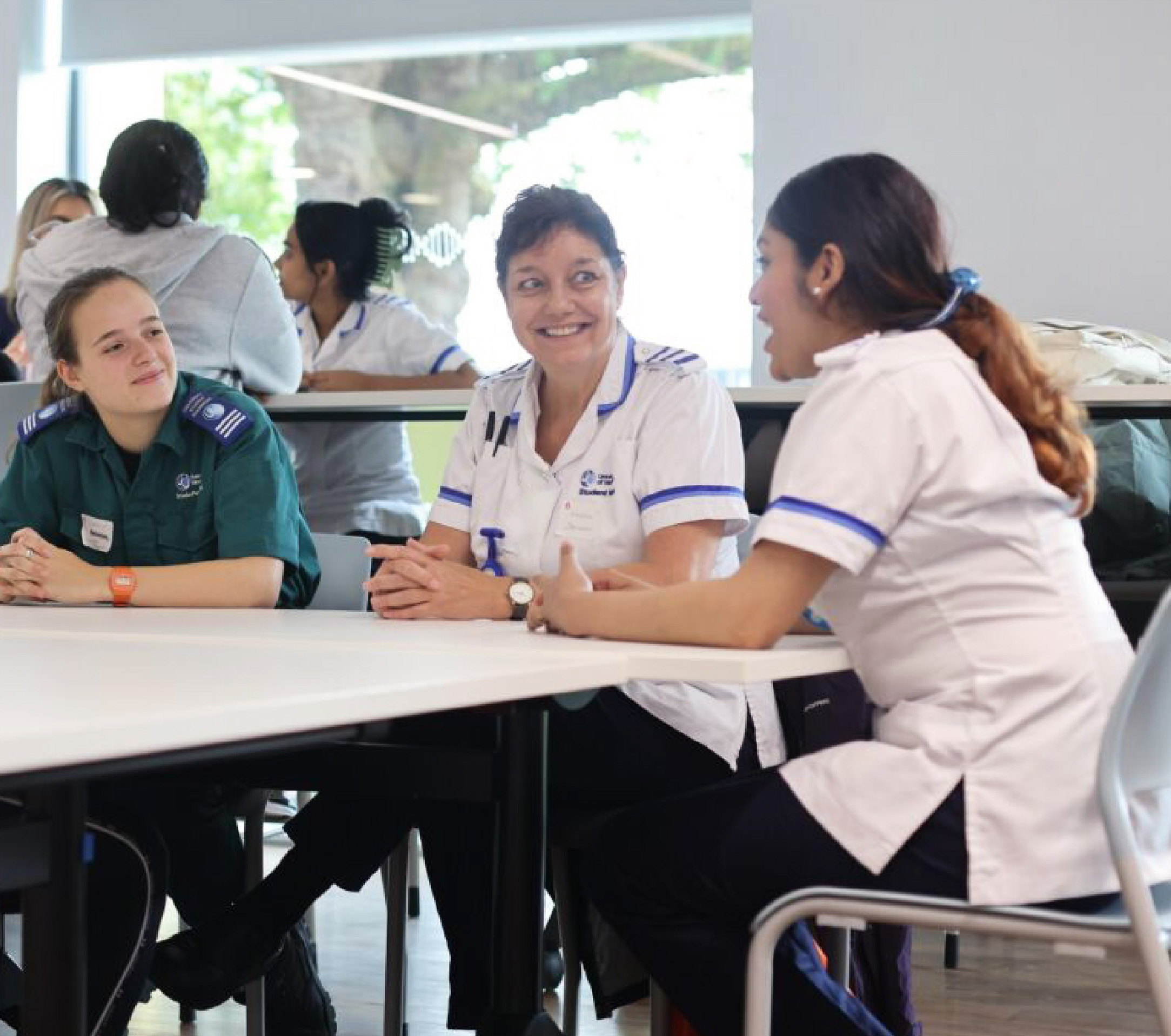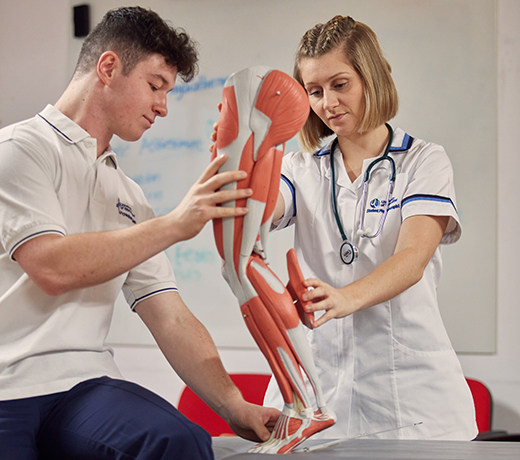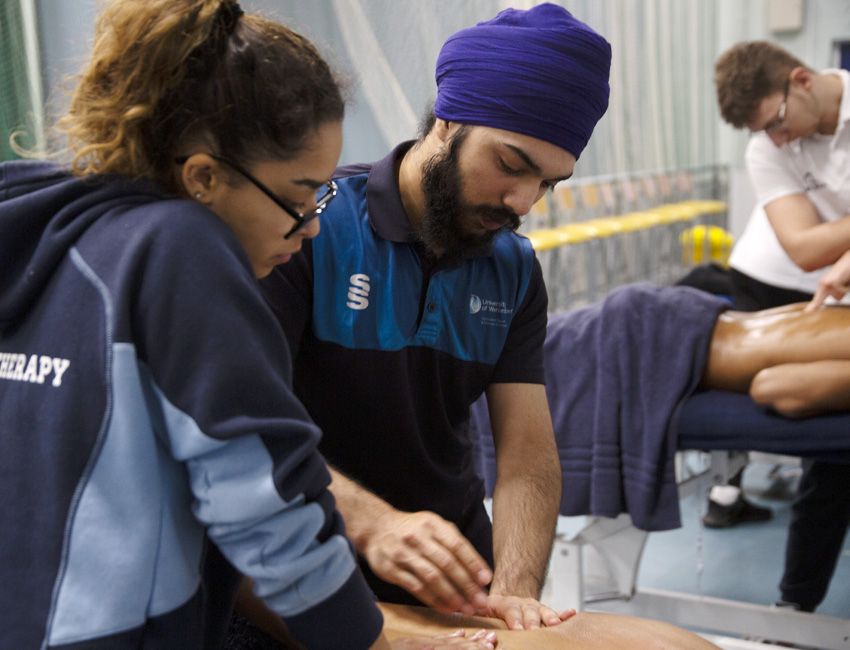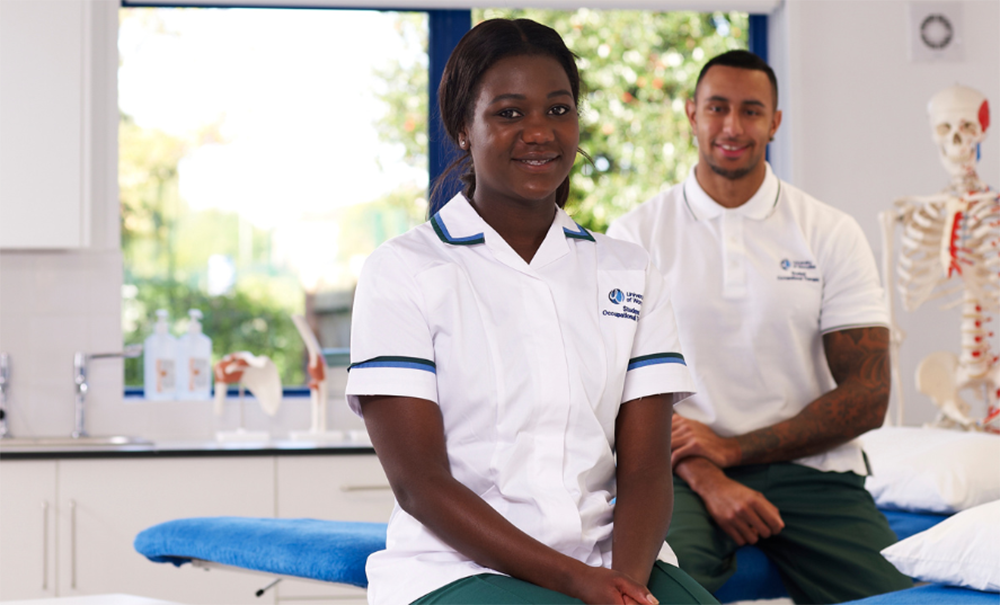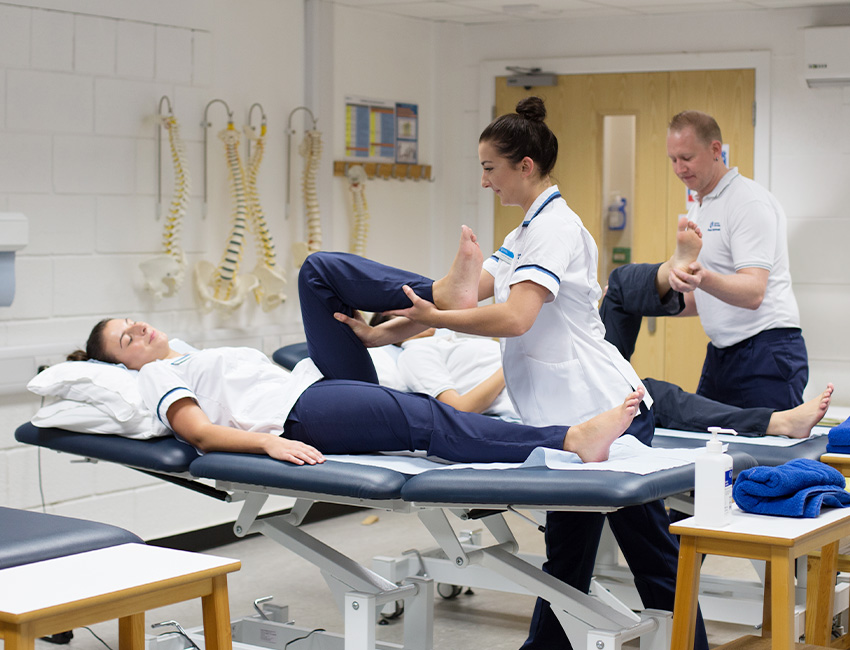This Foundation Year will build your knowledge of health topics, science and research. If you successfully pass the first year, you will be guaranteed a place on our three-year Physiotherapy degree.
of graduates are in work and/or study 15 months after this course
for graduate prospects
Following the foundation year this programme is accredited by the Chartered Society of Physiotherapy (CSP) and validated by the Health and Care Professions Council (HCPC). This means that when you graduate, you can apply for registration to practice as a Chartered Physiotherapist.
Overview
Our integrated foundation course prepares you for the undergraduate degree in Physiotherapy. Taught by University lecturers on campus, you’ll be part of the University from day one. If your current qualifications don’t allow you direct entry to degree level, this course is for you. If you pass the BSc (Hons) Physiotherapy with Integrated Foundation Year course, you will be guaranteed a place on our BSc (Hons) Physiotherapy degree.
During your Foundation Year, you’ll get a solid grounding in science and healthcare-related topics.
Study areas of human biology, psychology, sociology, and research, and get the knowledge, skills and confidence you need to take the next step in your education and career.
Using lectures, demonstrations, laboratory work, tutorials, small group work and interactive online learning sessions, we'll ask you to actively participate to help you get the most from the course.
You will be taught alongside other Foundation Year students with an interest in other Allied Health specialists such as Occupational Therapy, Paramedic Science, Nursing, Radiography and Dietetics for the first year of the course before joining the other Physiotherapy BSc students for the remaining three years.
Placements
You will undertake placement hours at every year during the final three years of your degree. Full-time practice learning placements equate to 37.5 hours for practice learning in each week of the 6-week placement block. All learning hours will be formally recorded and signed by an authorised signatory.
There are no placements in the foundation year.
Course content
You’ll study theories backed up by substantial evidence and will then apply this learning in professional practice.
Throughout the course you’ll gain a broad range of experience in the field, with experienced physiotherapists supervising as you complete placements in different clinical settings.
We regularly review our courses to reflect the latest research and developments in the subject area, as well as feedback from students, employers and the wider sector. As a result, modules may change to ensure the course remains current and relevant.
Careers
The wide scope of physiotherapy is one of its assets, making it an exciting and varied career.
You will become a scientifically oriented clinician with transferable intellectual and practical skills. You’ll also develop the advanced problem-solving and leadership skills required to succeed in the dynamic healthcare environment.
Physiotherapists are in demand across in the UK and abroad, so there are lots of exciting job opportunities.
You could:
- become a senior physiotherapist or service manager in the NHS in a hospital, care home, GP practice or other setting
- specialise in a specific area, like sports physiotherapy, stroke care or working with children
- work for a professional sports club
- become self-employed and set-up your own practice
- move into research or training
Course highlights
Teaching and assessment
Teaching is a mix of interactive seminars, lectures, one-to-one tutorials, and practical skills sessions. Your assessments will help prepare you for a career as a physiotherapist.
Teaching and assessment contents
You will be taught through a combination of interactive workshops, lectures, seminars and e-learning. Throughout the Course, you benefit from an integration of both innovative and traditional teaching methods. Large group lectures and cutting-edge research seminars delivered by academics as well as external speakers will complement your studies. Lectures may contain students from a variety of different courses for which the lecture content is also relevant.
A variety of stimulating, cutting-edge resources are also available to support your learning. Your learning will be supported by the University’s virtual learning environment. You will have individual access to electronic journals, content-rich study guides, and interactive online learning materials covering various science disciplines, formative online assessments and group discussion forums.
In addition, meetings with personal academic tutors are scheduled on at least four occasions in the first year and three occasions in each of the other years of a course. Throughout your degree you will have the opportunity to apply your developing knowledge and build on the depth of your understanding.
Entry requirements
UCAS tariff points required: 32
The UCAS tariff points can come from 1 A-level (grade C or above) or an equivalent qualification. You will also need:
- GCSE English and Mathematics at grade c/4 or above
- Clear commitment to pursuing a career in Physiotherapy
- To be at least 18 years old
However, all applicants will be judged on their individual merits and we may take other skills, qualifications and life experience into account. We welcome mature students without the usual formal qualifications and will consider your application based on your suitability and preparedness to complete the Foundation Year.
The BSc Physiotherapy with Foundation Year course is aimed at individuals who may have few or no relevant formal qualifications but who can demonstrate a clear commitment to pursuing a career in Physiotherapy. Personal, professional and educational experiences will be considered to determine motivation and ability to progress onto the degree course.
Any questions?
If you have any questions about entry requirements, please call our Admissions Office on 01905 855111 or email admissions@worc.ac.uk.
Fees
Fees contents
UK and EU students
In 2026/27 the standard fee for full-time home and EU undergraduate students on BA/BSc/LLB degrees and FdA/FdSc degrees is £9,790 per year.
Tuition fees are reviewed annually and may increase each year for both new and continuing students.
For more details on course fees, please visit our course fees page.
International students
In 2026/27 the standard tuition fee for full-time international students enrolling on BA/BSc/LLB degrees and FdA/FdSc degrees is £17,200 per year.
Tuition fees are reviewed annually and may increase each year for both new and continuing students.
For more details on course fees, please visit our course fees page.
How to apply
How to apply contents
Applying through UCAS
UCAS is the central organisation through which applications are processed for full-time undergraduate courses in the UK.
Read our how to apply pages for more information on the application process, or if you’d like to apply for part-time study.
Physiotherapy BSc with Foundation Year - B165
Contact
If you have any questions, please get in touch. We're here to help you every step of the way.
Admissions Office
admissions@worc.ac.uk01905 855111More to explore
Open Days
Visiting us is the best way to get a feel for student life at the University of Worcester.

The City of Worcester
Worcester is a welcoming university city with great transport links and plenty of student parking.

Accommodation
Benefit from our accommodation guarantee. We have rooms on campus to suit every budget including en-suite options.


